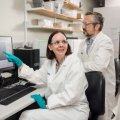UQ led research has identified new drugs that could potentially treat iron-overload disorders.
Associate Professor Paul Bernhardt and Professor Des Richardson from the Universities of Queensland and Sydney, have found a class of iron-binding drugs, called chelators, that reduce iron uptake and can reverse the effects of iron-overload.
Associate Professor Bernhardt said the new class of drugs showed great promise.
Humans cannot excrete iron naturally so iron levels may rise in people subjected to intensive blood transfusions for diseases such as thalassemia, which is a form of anemia.
Too much iron increases the growth of free radicals and can damage the heart and liver.
Associate Professor Bernhardt said there was a need to develop oral iron chelators as conventional treatments had severe drawbacks.
These conventional methods required long treatment periods of between 12 and 16 hours a day, five days a week where patients endured drug infusions via a needle.
After promising test results of chelators in his lab, Associate Professor Bernhardt said one drug had treated iron overload in mice when given orally.
Their results are published in the European Royal Society of Chemistry’s journal Dalton Transactions.
Associate Professor Bernhardt works in the Department of Chemistry in UQ’s School of Molecular & Microbial Sciences.
MEDIA: Dr Bernhardt is on study leave but can be reached on (p.bernhardt@uq.edu.au) or Miguel Holland at UQ Communications (3365 2619)
.jpg)



